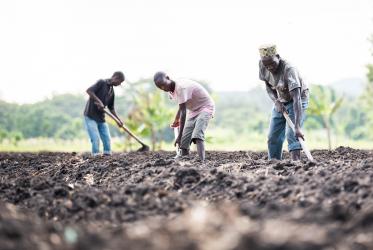Rev. Dr Olav Fykse Tveit, general secretary of the World Council of Churches (WCC), and Dr Jim Yong Kim, president of the World Bank Group (WB), discussed possible collaborative actions to end extreme poverty during a meeting in Washington, D.C., on 4 May.
Their meeting was a follow-up to a statement on the moral and spiritual imperative to end extreme poverty, signed by global religious leaders in February 2015. Dr Kim invited the WCC to explore what can be done together, in a kind of mutual commitment of the two organizations.
Tveit commended the World Bank president on his efforts to end poverty by 2030 by addressing issues of inequality, human dignity and climate change. He said, “The WCC Pilgrimage of Justice and Peace addresses structural, moral and political issues, and the WCC works collaboratively with other like-minded organizations to promote sustainable solutions to end poverty.”
Dr Kim of the World Bank shared his assessment of the global poverty situation and stated that faith communities and organizations play an indispensable role in combatting and ending extreme poverty. The World Bank is already working with faith communities in several countries through their governments, he noted.
Tveit said: “Churches, ecumenical organizations and ACT Alliance members have been working to end poverty for a long time. Churches and ACT members in the south have been involved in food security and sustainable agriculture, health services and education in a holistic way.”
Tveit added: “The integration of the Ecumenical Advocacy Alliance in the World Council of Churches in another expression of our ecumenical and holistic approach to these issues.”
Dr Kim also noted that the World Bank invested about $11 billion in climate-related activities last year and that the fundamental reason is that the poorest will without question be the most impacted by, for example, the increased intensity and number of extreme weather events.
The World Bank has changed its own work as well, Kim explained in the meeting, adding that this kind of change is phenomenal. Investing in people, in the short and medium term, is critical to ending extreme poverty.
He also mentioned that it is crucial to work on social protection, safety nets, health insurance, and all kinds of services that will make a difference in the lives of people. The World Bank is not going to dictate what countries need to do to address inequalities, but the countries do need to develop proposals on how to reach 40 percent of the poorest.
Tveit responded very positively after the meeting with the president of the World Bank: “This is a remarkable and significant perspective for an institution with all the means available that the World Bank has, and we hope their goals can be realized in their many efforts.”
The WCC general secretary and the WB president discussed ways of working more effectively. Concrete proposals were discussed to address poverty, inequality and climate change. The World Bank president was encouraged to relate to the WCC as both a platform and a network.
“We are represented in civil society; we are strong partners to connect with the grassroots communities, to deliver important messages that promote life with justice,” explained Tveit following the meeting.
The meeting between the WCC general secretary and the WB president also included the Rev. Adam Russell Taylor, the lead of the World Bank’s Faith-Based Initiative, and Mr. Rudelmar Bueno de Faria, WCC representative to the United Nations in New York City.
Read full text of statement: Ending extreme poverty: A moral and spiritual imperative







